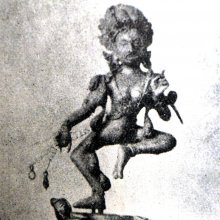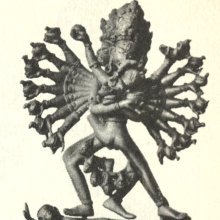Vetali, Vetālī, Vētāḷi: 8 definitions
Introduction:
Vetali means something in Buddhism, Pali, Hinduism, Sanskrit, Marathi, Tamil. If you want to know the exact meaning, history, etymology or English translation of this term then check out the descriptions on this page. Add your comment or reference to a book if you want to contribute to this summary article.
The Sanskrit term Vētāḷi can be transliterated into English as Vetali or Vetalii, using the IAST transliteration scheme (?).
Images (photo gallery)
In Hinduism
Purana and Itihasa (epic history)
Source: Cologne Digital Sanskrit Dictionaries: The Purana IndexVetālī (वेताली).—A river of the Bhadrā.*
- * Vāyu-purāṇa 43. 30.

The Purana (पुराण, purāṇas) refers to Sanskrit literature preserving ancient India’s vast cultural history, including historical legends, religious ceremonies, various arts and sciences. The eighteen mahapuranas total over 400,000 shlokas (metrical couplets) and date to at least several centuries BCE.
In Buddhism
Tibetan Buddhism (Vajrayana or tantric Buddhism)
Source: archive.org: The Indian Buddhist IconographyVetālī (वेताली) refers one of the eight Gaurīs, commonly depicted in Buddhist Iconography, and mentioned in the 11th-century Niṣpannayogāvalī of Mahāpaṇḍita Abhayākara.—Her Colour is red; her Symbol is the chain; she has two arms.—The third goddess in the Gaurī group is Vetālī.
Vetālī is described in the Niṣpannayogāvalī (pañcaḍāka-maṇḍala) as follows:—
Source: academia.edu: The Structure and Meanings of the Heruka Maṇḍala“Vetālī is red in colour and holds in her two hands the chain”.
[All the deities are violent in character with fearful appearance and ornaments, and garlands of heads. They dance in pratyālīḍha and show the raised index finger with clasped fist against the chest, as the common gesture.]
Vetālī (वेताली) is also mentioned as the Ḍākinī of the western gate in the Jñānacakra, according to the 10th century Ḍākārṇava chapter 15. Accordingly, the jñānacakra refers to one of the three divisions of the saṃbhoga-puṭa (‘enjoyment layer’), situated in the Herukamaṇḍala. The four gate Ḍākinīs [viz., Vetālī] each has the same physical feature as the four Ḍākinīs starting with Lāmā.
Source: OSU Press: Cakrasamvara SamadhiVetālī (वेताली) is the name of a deity [i.e., oṃ caṇḍeśvaryai svāhā; oṃ vetālyai svāhā], according to the Kalaśa Pūjā [i.e., Kalasha Worship] ritual often performed in combination with the Cakrasaṃvara Samādhi, which refers to the primary pūjā and sādhanā practice of Newah Mahāyāna-Vajrayāna Buddhists in Nepal.

Tibetan Buddhism includes schools such as Nyingma, Kadampa, Kagyu and Gelug. Their primary canon of literature is divided in two broad categories: The Kangyur, which consists of Buddha’s words, and the Tengyur, which includes commentaries from various sources. Esotericism and tantra techniques (vajrayāna) are collected indepently.
Languages of India and abroad
Marathi-English dictionary
Source: DDSA: The Molesworth Marathi and English Dictionaryvēṭāḷī (वेटाळी) [or वेंटाळी, vēṇṭāḷī].—f (vēṭa) A twist or loose roll of hay or straw; a wisp.
Source: DDSA: The Aryabhusan school dictionary, Marathi-Englishvēṭāḷī (वेटाळी).—f A twist of straw. A wisp.
Marathi is an Indo-European language having over 70 million native speakers people in (predominantly) Maharashtra India. Marathi, like many other Indo-Aryan languages, evolved from early forms of Prakrit, which itself is a subset of Sanskrit, one of the most ancient languages of the world.
Sanskrit dictionary
Source: Cologne Digital Sanskrit Dictionaries: Monier-Williams Sanskrit-English DictionaryVetālī (वेताली):—[from vetāla] f. Name of Durgā, [Harivaṃśa]
Sanskrit, also spelled संस्कृतम् (saṃskṛtam), is an ancient language of India commonly seen as the grandmother of the Indo-European language family (even English!). Closely allied with Prakrit and Pali, Sanskrit is more exhaustive in both grammar and terms and has the most extensive collection of literature in the world, greatly surpassing its sister-languages Greek and Latin.
Tamil dictionary
Source: DDSA: University of Madras: Tamil LexiconVētāḷi (வேதாளி) noun < vētālī. Kāḷī; காளி. (பிங்கலகண்டு) [kali. (pingalagandu)]
Tamil is an ancient language of India from the Dravidian family spoken by roughly 250 million people mainly in southern India and Sri Lanka.
See also (Relevant definitions)
Starts with: Vetalika, Vetaliyar.
Ends with: Raudravetali, Shitavatoshnavetali, Ushnavetali, Vajravetali.
Full-text: Ushnavetali, Shitavatoshnavetali, Konavasi, Pedhala, Caturdevi, Udaga, Vishuddhaheruka, Krodhishvari, Samayasundara, Vetala.
Relevant text
Search found 5 books and stories containing Vetali, Vetālī, Vēṭāḷī, Veṭālī, Vētāḷi, Vethali, Vethaali, Vaethaali, Vedali, Vedhali; (plurals include: Vetalis, Vetālīs, Vēṭāḷīs, Veṭālīs, Vētāḷis, Vethalis, Vethaalis, Vaethaalis, Vedalis, Vedhalis). You can also click to the full overview containing English textual excerpts. Below are direct links for the most relevant articles:
The Indian Buddhist Iconography (by Benoytosh Bhattachacharyya)
The Agni Purana (by N. Gangadharan)
Guhyagarbha Tantra (with Commentary) (by Gyurme Dorje)
Text 16.3 (Commentary) < [Chapter 16 (Text and Commentary)]
Text 15.25 (Commentary) < [Chapter 15 (Text and Commentary)]
Chapter 16 - Emanation of the Maṇḍala of Buddha-speech < [Chapter 16 (Text and Commentary)]
Buddhism in Andhra – Its Arrival, Spread and < [July – September, 1994]
Shakti and Shakta (by John Woodroffe)
Chapter XXVIII - Matam Rutra (the Right and Wrong Interpretation) < [Section 3 - Ritual]

